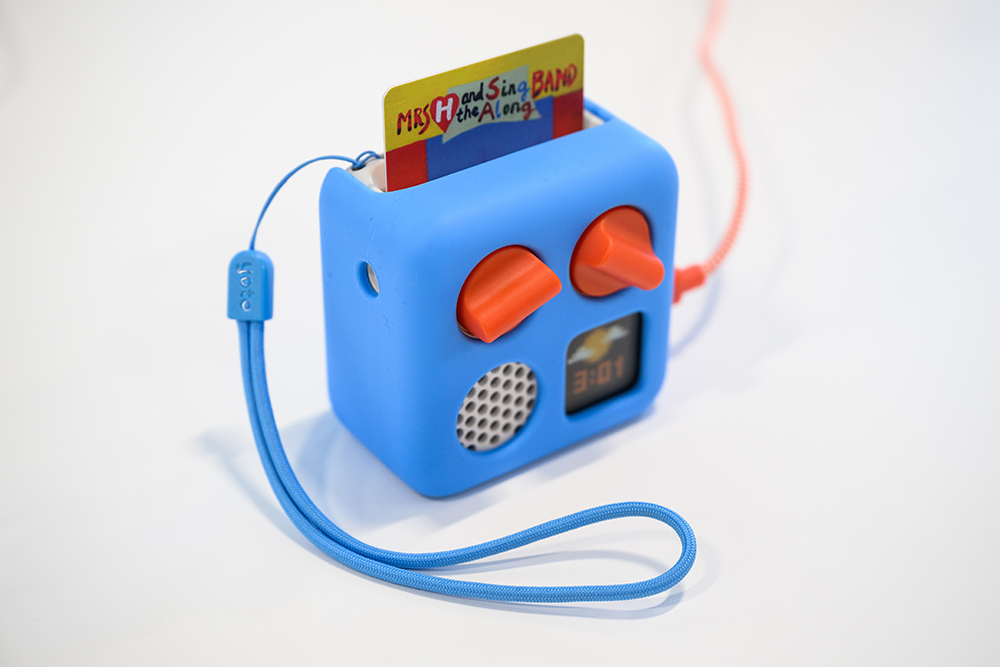If you want a handy metaphor for contemporary childrearing, it’s a colourful plastic box with big red buttons on it. Yoto is the name, and before long, you’ll be seeing it where you already see children using screens – so pretty much everywhere. One in 50 British homes with a child under 12 is said to have one. It’s like a CD player-cum-iPad with ambitions to run your child’s life. The essential bits of it are plastic cards that you or the child – the idea is that the child has agency here – slot into the player to listen to a story, but there’s a whole range of other options – radio, podcasts, night lights, sound effects.
Nine in ten Yoto owners use the machine at night; that’s a lot of people not reading a book out loud
There are no distracting visuals, except for a pixelated screen picture that varies with the card. One plays Olivia Colman reading The Tale of Peter Rabbit, with birdsong, and what could be more wholesome? Or A Bear Called Paddington, read by Stephen Fry, if that’s your bag. Disney, Julia Donaldson (the Gruffalo story brings up a picture of the beast), Peppa Pig, Roald Dahl – all there.
Or there’s Yoto’s own educational material, with content that the most progressive parent couldn’t find fault with. Take the BrainBots, cute robots who make learning fun: ‘While the children are off on a school trip, the BrainBots are on an adventure of their own – undertaking training to earn their Sea Defenders Upgrade! Join Nellie, Buzz, and Gibbs as they explore our world’s oceans and learn what we can do to protect them.’
Then there’s the Yoto radio – all child-friendly content – and Yoto podcasts. There’s Yoto mindfulness with a woman with a Scottish accent. Yoto offers a routine for the entire day, from the Yoto wake-up method (‘When your child sees the sun appear on their player they will know when it is time to rise and shine. Or if the moon is still out it is still time to snuggle under the covers’) through breakfast with the free mini podcast.
Through the day, Yoto offers music or stories which the child can select from their wallet. At night, they might listen to a story, or hear their daddy – not actually present, obviously – read them one of his own. And the Yoto can give off a lovely light, coloured just as you like, with background noise of your choice. A crackling fire? A washing machine? All there.
What’s not to like about this idyll? The creators of Yoto, Ben Drury and Filip Denker, devised it just before lockdown, with the idea of putting children in charge of their devices, without screens or ads. As depicted on the Yoto website, it’s a friend, nanny, parent. It’s Listen With Mother, nightlight and life coach. You see a child springing from bed as the Yoto birdsong wakes him up and the first thing he does is put in a Yoto story card; he grabs the Yoto to take him to breakfast, where he and his siblings listen happily to a Yoto podcast; on the return from school, the happy, diverse children grab their Yotos as they come in; as a child does her homework, there’s Yoto in the background. Banana pancakes? Yoto shows how to make them too. As for bedtime, there’s a special Yoto toothbrushing routine to a catchy beat: ‘Toothbrush! Let’s go!’
This is childrearing subcontracted to a plastic cube which, minus the accessories, costs £99 (the small version for journeys is £60) – with story cards up to a tenner each. For parents who don’t have time to wake their children up, talk to them, read to them, cheer them up when they’re scared at night, this is parenting as a box.
I like to think that this is just a novelty thing – that what we’re not seeing is Yoto being chucked into a corner because the children are playing football or gathering dust while the child plays with the dog – but I’m probably deluding myself. Nine in ten Yoto owners use the machine at night; that’s a lot of people not reading an actual book out loud.
You know, Fisher-Price used to do a fun child’s cassette player for way less money, and there are umpteen children’s stories and songs on tape around. Indeed, any old-fashioned tape recorder with tapes is less expensive. But what you didn’t get with the old version was the concept of your child’s whole day curated by a box.
The real case against Yoto is that it’s yet another way of not reading books. The other day I was in a second hand bookshop where there were Puffin paperbacks for two quid each. As for letting a child hear books, there’s a free version of that: actual grown-ups reading a story.






Comments